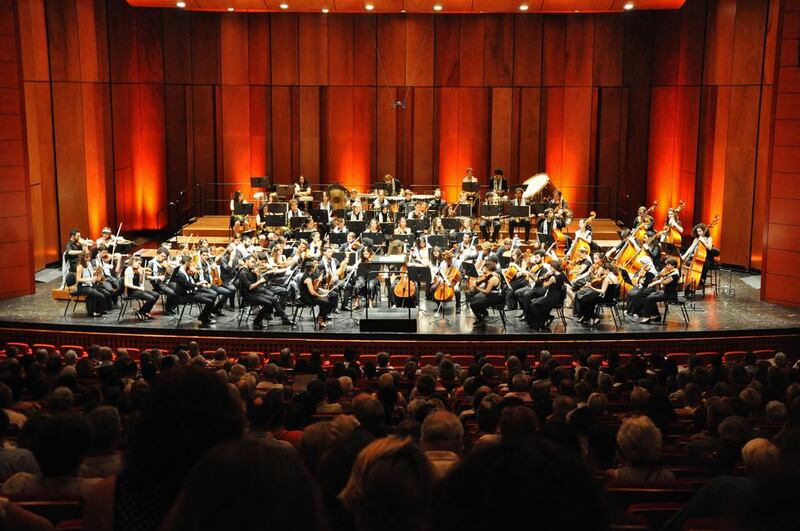It is lunchtime on a sunny day in the Scottish city of Glasgow, and the general director of The Edward Said National Conservatory of Music is making a thoughtful observation about the aims of its Palestine Youth Orchestra.
Suddenly, a ping-pong ball bounces across the table. Suhail Khoury barely bats an eyelid.
“Having an orchestra can tell people that young Palestinians are like anyone else, despite their situation,” he says. “They like to play music, they like to have fun.”
Fun, in this case, means a game of table tennis at the Royal Conservatoire of Scotland, during a break from rehearsals for the PYO’s first tour of the United Kingdom, which begins in Perth today. The moment of levity sums up their approach: incredible passion about their work, but a desire to enjoy themselves as well.
“The atmosphere is like being in a family,” says Lamar Elias, a violinist from Bethlehem. “We wait from one year to the next to come together. Of course, an orchestra has to have time to practise, but it’s actually easier for us to gather here in Scotland than it is in Palestine itself.”
That the PYO exist at all is a triumph. Set up by Khoury in 2004 to showcase and encourage Palestinian talent and carry a message of love, hope and peace, there are constant logistical hurdles to overcome due to the difficulties of living in Israeli-occupied territories. Two musicians, for example, did not receive permits to leave Gaza, let alone board a flight to the UK.
Even those who made it to Glasgow talk of the problems of gathering in large groups in Palestine – which is why even the simple act of rehearsing together is such a joy.
“I was once on a tour with another orchestra and some of us couldn’t play the concert in Jerusalem because we didn’t have permits,” says violinist Diama Al Hourami, from Ramallah.
“But you want to play so much, you try to find ways to do it – which can become really dangerous. A friend of mine jumped the wall, injured himself and couldn’t play in the concert anyway. This is the reality.” The impetuosity of youth – but even among the more experienced musicians offering a guiding hand to these talented, ambitious young people, whose ages range from 13 to 26, there is similar zeal and enthusiasm.
“Palestine is an environment full of tension and hostility but The Edward Said National Conservatory of Music is a hub of creativity,” says Wissam Boustany, a flautist, trustee and musical adviser. “The PYO bring Palestinians together – whether they are studying there or not – to meet, learn and be inspired. And as a touring orchestra, I genuinely think it has become a flagship of the Palestinian people.”
It is to the PYO’s credit that mostly they want to emphasise the positive effect they can have on perceptions of Palestine rather than get bogged down in being seen as – as Boustany puts it – victims. He talks of the importance of celebrating “kids with light in their eyes, full of talent to show”.
Al Hourami, too, says her experiences on previous tours of Italy and France were full of encounters with people not only intrigued by what life was like beyond the news headlines, but also surprised at their skill.
“I am much better at playing classical than I am Arabic music,” she says. “I know, it seems strange.”
A PYO concert is a challenge, musically, because it features western classics – in this case Beethoven's Overture Leonore No 3 – and Arabic music. Nai Barghouti, from the port city of Acre, will sing two pieces by the Rahbani Brothers and one by Zakaria Ahmad in an impressively diverse programme.
“I love the fact we’re doing Arabic songs – it shows who we are,” says Barghouti. “Yes, we do go through a lot every day just to be able to play music as a human right, but the orchestra also shows another artistic side to us.
“These young people are talented, amazing and beautiful. It would be easy for them to give up but they refuse to be limited.”
The person charged with bringing these disparate sounds together is conductor Sian Edwards. She says the 10 years she’s spent working with the orchestra have been “enormously rewarding”. “Initially, they literally had to learn how to sit in an orchestra and build up the music,” she says. “I remember that first concert in Jordan – it was a revelation, a very beautiful thing that these Palestinian kids were doing. And their confidence and sense of self-worth has just grown and grown.
“They’re an inspiration – and it’s thrilling to come back to the orchestra and hear that some of these people are now studying music abroad or are professional musicians.”
There are no firm plans to play in the UAE yet – they hope to do so soon – but a CD release is in the works for next year and a DVD is available of a concert in Athens in 2010. Khoury is rightly proud.
“I had big hopes, but we’ve exceeded them,” he says. “We’ve made people feel proud of Palestine, which is something amazing.”
artslife@thenational.ae





